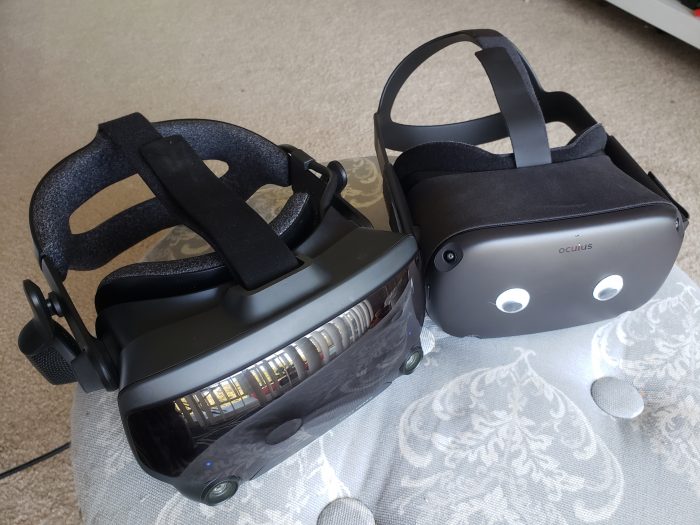What VR headset should you get in 2020?
People often ask me, “what VR headset should I get?”
To which I always reply with , “yes”.
But it’s time to go a bit more in depth than that, so I decided to write a guide for total newbies.
Here are my humble thoughts based on my experience:
If you can afford it, get a Valve Index.
If you cannot afford an Index, get an Oculus Quest.
I currently own or have owned the following headsets:
Valve Index, Oculus Quest, Samsung Odyssey Plus, HP Windows Mixed Reality, PSVR, HTC Vive and few a others.
I’ve tested out and tried the following headsets:
HP Reverb, Varjo, PicoVR, Oculus Rift, Oculus Rift S, Lenovo Mirage, Vive Cosmos, Oculus Go, Lenovo Explorer, Vive Pro.
As of the writing of this blog post, the Oculus Quest and Valve Index are the two best headsets in the world but for very different reasons. Honestly, the best VR headset will depend on your budget, your time and what use cases matter to you the most.
Do you want the VR equivalent of a fine dining experience or are you content with your favorite fast food joint?
Let’s explore these two options and hopefully by the end of this post you might have some idea of what is available to you.
Let’s start with the Index.
The Valve Index is the pinnacle of high end virtual reality on the PC for consumers. Sure there are other headsets with higher resolutions, wider fields of view and panels that display deeper blacks. However, these HMDs fail to deliver on a complete package that is as polished as the Index. For example, the HP reverb has a significantly better resolution than the Index but the controller tracking sucks in comparison. The Vive Pro can do wireless with an attachment and the Amoled panels can display deeper darker images (if you’re into space sims) but when you compare build quality, audio, refresh rate and future proofing I think the Valve Index comes out on top.
Let’s examine the pros and cons of the Index.
Pros
- Super accurate tracking via it’s lighthouse system. You can do room scale, sitting down or standing with full 360 degree tracking.
- The ability to tweak the headsets settings without having to exit VR, like the refresh rate, resolution and few other things.
- The Index controllers are a great compromise in giving you finger tracking while getting tactile feedback holding a physical controller.
- Extremely comfortable headset. Out of all the VR headsets I’ve tried/owned this is the one I can spend the most time in.
- Amazing audio, with it’s over the ear speakers, the immersion factor and comfort cannot be understated.
- Huge library of games and experiences. There are thousands of games, apps, and experiences available when you combine SteamVR, WebVR and the Oculus store via ReVive. There’s something for everyone out there! (Lots of free apps)
- Built by Valve and it’s consistently being improved on with software updates.
- Insane 144hz refresh rate. This is something you have to try to understand, because it makes VR feel more “real”.
- Get your dance on! You can do full body tracking with the HTC tracker pucks but you might need to have lighthouse 1.0, the lighthouses that come with the Index might not be compatible. ( this might be subject to change though, so do your own research)
- Minimal screen door effect compared to other headsets.
Cons
- This headset requires a requires a powerful computer and that can get expensive. There’s free software on Steam that checks if your computer can run the Index it’s called “Are you ready for Valve Index”. Check it out and see if you the necessary specs to run this HMD. I’m running my Index on an RTX 2080 and this headset pushes my graphics card to its very limits.
- The lenses are prone to get scratched easily. Do not wear glasses with your Index. There are plenty of horror stories on reddit.
- People with VR ready gaming laptops beware, you’ll need a mini display port adapter and not all of them work. Finding one was a pain for me. I had success with the Club 3D cable on Amazon but your mileage may vary.
- Takes a long time to initially set up and get started, so its not a headset you can take easily on the “go”.
- It’s hard to clean the face gasket.
Now let’s examine the Quest
The Oculus Quest is a standalone VR headset with 6 degree of freedom head tracking + controllers. It also has the capability of playing PCVR games by purchasing a separate Oculus Link cable.
Pros
- Take it anywhere and play almost everywhere with no wires. Perfect for physically active experiences and games.
- The play space can be huge if you have enough space. (You can play outside as long as there is ample shade covering you from the sun)
- Oculus recently added hand tracking, while it’s not perfect it has the potential to be the beginning of something pretty awesome.
- Ability to play PCVR games on your Quest with the Link cable but don’t expect it be better than headsets designed from the ground up to work with PC.
- The Oculus Quest is great to bring along to gatherings! Watch how easily you’ll make friends showing it around and casting to nearby TV.
- Getting set up and running takes less than minute. That’s a big deal if you only have 15 minutes to escape to the metaverse.
- For the price of one Index you can buy two Quests and hang out in the metaverse with your partner, your siblings or your best friends.
- Great audio with it’s over the ear speakers.
- Large library of Indie games via the SideQuest app. Check out “Tea for God” and “Crisis Vrgade”. They’re great and they’re free!
- Great for media viewing not just games. (youtube, movies, porn)
Cons
- This thing is really front heavy. Its not comfortable after 30 minutes so you’ll need to attach a counter weight. Google “frankenquest” for more info.
- The default face gasket is not comfortable in my opinion, it’s worth investing in a pleather VR cover.
- The battery life is 2 to 3 hours depending on what you’re doing with it. That might not be enough for some people so attaching a battery in the back of the headset is worth exploring.
- It’s made by Facebook.
- The Quest is packed with so many features, it runs the risk of being a jack of all trades, master of none. It’s good to temper your expectations.
Note: If you really care about wireless VR on the PC. Get a Vive Pro and get Index controllers to go with it. The Pro is a good headset but the Index is better in field of view, refresh rate, minimizing screen door effect and overall build quality.
“But what about the Oculus Rift S? Or other Windows Mixed reality headsets?” You might say.
They’re fine, the metaverse welcomes you with open arms 🙂. Just make sure you are confident in your decision and enjoy yourself!
As of the writing of this blog post, there seems to be shortages of the Valve Index in certain regions so this might complicate things for you. Despite this, I don’t anticipate a competitor coming out with better alternatives to the Index and the Quest in 2020, but I might be wrong; a lot can happen in the course of a year in the VR industry. Still, I would encourage you to not get too caught up waiting forever! if you’ve been waiting to jump on the VR hype train, now is the time!
It’s also worth mentioning that Nvidia is releasing new graphics cards some time in the next few months, so I know of people who are waiting on that to jump into in the metaverse.
On another note, if have morals and principles and don’t feel comfortable contributing to Mark Zuckerberg’s evil data collection empire, but can’t afford a Valve Index, you can get a Samsung Odyssey that can run on older computers but your mileage may vary and I would encourage you to do your research before spending your hard earned cash. You can also get a PSVR, it has a solid line up of games and experiences but that comes at the consequence of being locked into Sony’s walled garden.
Ultimately, what VR headset is best for you depends on your use case. Are you an educator? A gamer? An artist? An entertainer? A developer? A marketer? a consumer of passive media? a social butterfly? It’s important to explore what specific things you envision yourself doing in VR and choosing a headset that best fits your needs and your budget.
If you are willing to be more compromising on specs or your budget won’t allow you to get an Index, I would recommend a Samsung Odyssey plus.
Unfortunately there is no legit competitor to the Quest in the Standalone VR category but it won’t be long before competition starts flooding the market, since Facebook has proven that there is clear demand for this technology and competition is good for consumers! Keep an eye out for Samsung, Sony, Acer and other players in the game this year.
I hope this guide helped, there is so much to write on this subject and I don’t have the time to write a book about it. If you have questions hit me up on twitter @entervr or @cr1s_m1randa . Try not to get too caught up in paralysis by analysis, there’s a whole metaverse waiting for ya!
See you there!
By Cris M.



